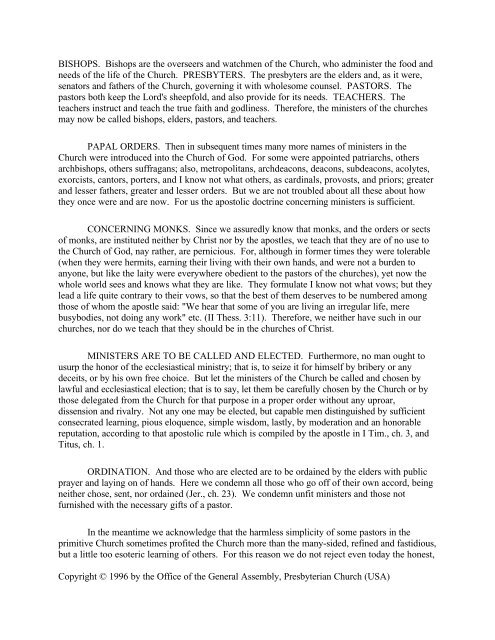The Book of Confessions - The Presbyterian Leader
The Book of Confessions - The Presbyterian Leader
The Book of Confessions - The Presbyterian Leader
Create successful ePaper yourself
Turn your PDF publications into a flip-book with our unique Google optimized e-Paper software.
BISHOPS. Bishops are the overseers and watchmen <strong>of</strong> the Church, who administer the food and<br />
needs <strong>of</strong> the life <strong>of</strong> the Church. PRESBYTERS. <strong>The</strong> presbyters are the elders and, as it were,<br />
senators and fathers <strong>of</strong> the Church, governing it with wholesome counsel. PASTORS. <strong>The</strong><br />
pastors both keep the Lord's sheepfold, and also provide for its needs. TEACHERS. <strong>The</strong><br />
teachers instruct and teach the true faith and godliness. <strong>The</strong>refore, the ministers <strong>of</strong> the churches<br />
may now be called bishops, elders, pastors, and teachers.<br />
PAPAL ORDERS. <strong>The</strong>n in subsequent times many more names <strong>of</strong> ministers in the<br />
Church were introduced into the Church <strong>of</strong> God. For some were appointed patriarchs, others<br />
archbishops, others suffragans; also, metropolitans, archdeacons, deacons, subdeacons, acolytes,<br />
exorcists, cantors, porters, and I know not what others, as cardinals, provosts, and priors; greater<br />
and lesser fathers, greater and lesser orders. But we are not troubled about all these about how<br />
they once were and are now. For us the apostolic doctrine concerning ministers is sufficient.<br />
CONCERNING MONKS. Since we assuredly know that monks, and the orders or sects<br />
<strong>of</strong> monks, are instituted neither by Christ nor by the apostles, we teach that they are <strong>of</strong> no use to<br />
the Church <strong>of</strong> God, nay rather, are pernicious. For, although in former times they were tolerable<br />
(when they were hermits, earning their living with their own hands, and were not a burden to<br />
anyone, but like the laity were everywhere obedient to the pastors <strong>of</strong> the churches), yet now the<br />
whole world sees and knows what they are like. <strong>The</strong>y formulate I know not what vows; but they<br />
lead a life quite contrary to their vows, so that the best <strong>of</strong> them deserves to be numbered among<br />
those <strong>of</strong> whom the apostle said: "We hear that some <strong>of</strong> you are living an irregular life, mere<br />
busybodies, not doing any work" etc. (II <strong>The</strong>ss. 3:11). <strong>The</strong>refore, we neither have such in our<br />
churches, nor do we teach that they should be in the churches <strong>of</strong> Christ.<br />
MINISTERS ARE TO BE CALLED AND ELECTED. Furthermore, no man ought to<br />
usurp the honor <strong>of</strong> the ecclesiastical ministry; that is, to seize it for himself by bribery or any<br />
deceits, or by his own free choice. But let the ministers <strong>of</strong> the Church be called and chosen by<br />
lawful and ecclesiastical election; that is to say, let them be carefully chosen by the Church or by<br />
those delegated from the Church for that purpose in a proper order without any uproar,<br />
dissension and rivalry. Not any one may be elected, but capable men distinguished by sufficient<br />
consecrated learning, pious eloquence, simple wisdom, lastly, by moderation and an honorable<br />
reputation, according to that apostolic rule which is compiled by the apostle in I Tim., ch. 3, and<br />
Titus, ch. 1.<br />
ORDINATION. And those who are elected are to be ordained by the elders with public<br />
prayer and laying on <strong>of</strong> hands. Here we condemn all those who go <strong>of</strong>f <strong>of</strong> their own accord, being<br />
neither chose, sent, nor ordained (Jer., ch. 23). We condemn unfit ministers and those not<br />
furnished with the necessary gifts <strong>of</strong> a pastor.<br />
In the meantime we acknowledge that the harmless simplicity <strong>of</strong> some pastors in the<br />
primitive Church sometimes pr<strong>of</strong>ited the Church more than the many-sided, refined and fastidious,<br />
but a little too esoteric learning <strong>of</strong> others. For this reason we do not reject even today the honest,<br />
Copyright © 1996 by the Office <strong>of</strong> the General Assembly, <strong>Presbyterian</strong> Church (USA)




